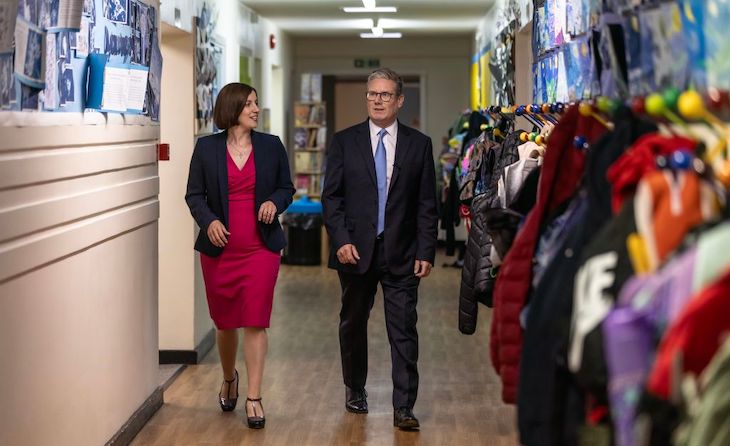It appears that Labour is determined to ensure that choice in education is only for those who can afford it. The government has just announced that it is slashing funding for the International Baccalaureate (IB) in state schools, meaning the qualification may now only be offered in the private sector.
What choice do parents of these children now really have?
Just like the mid-year cancelling of the Latin Excellence Programme, this is yet another example of Labour’s utilitarian fear of excellence and difference. The IB Diploma differs from A-levels in that it is a much broader course: rather than studying three subjects post-16, pupils study six. English, Maths and a modern language are compulsory, and then students must also choose a science and humanities subject.
They must also write a 4,000-word research essay on a subject of their choice; take a Theory of Knowledge course that encourages critical and lateral thinking; and participate in ‘CAS’ (Community, Activity, Service), which is designed to help foster personal growth and extracurriculars. There is also a ‘Career-related Programme’ which helps students gain work experience and vocational skills too.
Alas, Labour has decided that this globally-recognised, highly prestigious course is apparently no longer ‘worth it’: yet another academically aspirational programme sacrificed at the altar of austerity. Education Secretary Bridget Phillipson has repeatedly said that she wants to expand opportunities for working-class children, but she repeatedly enacts policies that do the exact opposite. It appears that under current plans, there will be no escape routes for bright, ambitious children who seek to ‘rise above their station’.
After all, what choice do parents of these children now really have? They are unlikely to be able to send their kids to grammar school, given that Labour closed the vast majority in the 1960s and ‘70s. The ones that do remain, in areas such as Kent, Buckinghamshire and Lincolnshire, are so oversubscribed that there is often a huge property premium to be near them (average house prices in Amersham, for example, are over £700,000). In 1997, Labour also abolished the Assisted Places Scheme, which sent poor, gifted children to top private schools, and then phased out dedicated funding for Oxbridge, and so these are no longer options either.
Fast forward to the present day, and Labour’s war on free schools and academies is further undermining parental choice. Ministers are handing councils greater powers to make academies cut places or stop them from expanding; they insist that this is necessary to stop other schools collapsing as pupil numbers fall, but this feels like once again success is being punished. The government has admitted that the reforms will mean that more parents will be denied their first choice school, which already happened to a record number of parents last year.
These parents might consider home-schooling instead, but Labour is also making this more difficult. The new ironically-named Children’s Wellbeing and Schools Bill means parents no longer have an automatic right to homeschool their children, and local authorities have more power to ‘inspect’ those who do. The intention is supposedly to avoid a repeat of tragedies such as the brutal murder of ten-year-old Sara Sharif, but these shocking scandals were unrelated to homeschooling (Sara Sharif was murdered in the summer holidays, and five months prior teachers at her school had reported the fact she had facial bruising). They were instead the result of incompetent, disjointed social and legal services – and using them as justification for giving councils the responsibility for deeming what is a ‘suitable’ education could be seen as little more than a state-surveillance power-grab.
The final option, then, would be private school. Yet Labour’s VAT policy has made private schools unaffordable for all but the very wealthiest. Increased financial pressures on these schools is forcing them to make difficult decisions, such as reducing bursaries or closing altogether. Britain’s independent schools are the envy of the world, one of our most enduring success stories. They also contribute more than £16 billion to the economy. We should be doing everything we can to make them more accessible and affordable. Instead, 25,000 pupils have been effectively forced out of private schools since Labour took power (eight times the fall the government predicted by this point.)
Grammar schools, free schools, academies, home-schools, private schools, schools that offer the IB: Labour seems determined to punish anyone who dares to be different. This one-size-fits-all approach will not only erode standards (by insisting that the best of our schools must be levelled down), but also parental choice. In the name of equality we must apparently be the enemy of excellence, but it will be increasingly hard for parents to find it.







Comments